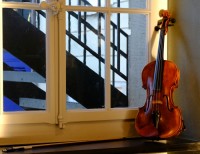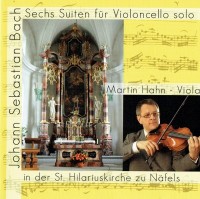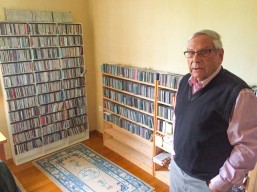
Where it all began... |
Violist Martin Hahn is awaiting me by the Freie Musikschule Basel, Switzerland. Here he enjoyed his first viola lessons, almost 40 years ago, with Giselher Langscheid.

Two days off the orchestra - Martin Hahn took his bicycle and made his way through the Schwarzwald, to his home town at the Hochrhein, Germany. The bicycle is Martin Hahn's second passion - after the viola - and an important activity to keep his work-life balance.
Two years ago, at the Bratschistentag in Trossingen, Hahn first learnt about the website music4viola.info. He was absolutely thrilled and started spreading the news with his colleagues. Hahn estimates that an 80 to 90% of violists aren't yet aware of this comprehensive offer.
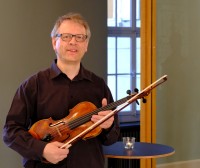
Martin Hahn is a versatile musician, pursuing various paths in his career. The most important one is his job with the Badische Philharmonie Pforzheim, the orchestra that accompanies all performances of the Musiktheater am Stadttheater Pforzheim. The Badische Philharmonie performs as a guest in countless south German and Swiss locations, which don't have their own music theatre, thus contributing significantly to the cultural offering in rural areas. The orchestra furthermore plays a central role in the concert life of the city Pforzheim.
Twelve years ago, Hahn founded a private music school and a viola shop in his large house, south of the city. As a chamber musician, he mostly plays in line-ups with voice, viola and piano, collaborating with his wife, soprano Heidrun Maria Hahn, and pianist Wolfgang Heinz (music director at the Staatstheater Stuttgart). The trio is planning a CD production this fall, with works by Adolf Busch, Jan Koetsier and Otto Jochum. The Hahns are following the trails of singer Lore Fischer and her husband Mannes Rudolf Nel, who was a violist at the Bayrischer Rundfunk. The two deceased artists had worked on a big repertoire. Their bequest has turned out to be a great fundus for Hahn and his wife.
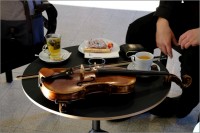
the Performance at the Stadttheater
Mr. Hahn, how did you come to play viola?
At the age of 10, I started playing the violin, like many violists do. I am from Bad-Säckingen, close to Wehr, the home town of Anne-Sophie Mutter. Many exceptional talents have emerged from this region. Just like shooting stars, following a comet. When I was sixteen, I participated at a chamber music course in Stuttgart. There was a violist missing, and my teacher Giselher Langscheid said: «Here's a viola for you, go for it...». Within one or two weeks, I had switched. Later I studied with Langscheid at the Freie Musikschule in Basel, and with Henrik Crafoord in Bern.
Are you mainly an orchestra musician?
Yes, I recently celebrated my 25 years service anniversary with the Badische Philharmonie Pforzheim. The Theater Pforzheim is Germany's smallest theatre with three sectors. We often perform as guests, also in Switzerland, with locations such as Langenthal and Baden. In the south German area, for example, we visit Lahr, Waiblingen, Schwäbisch-Gmünd; these places don't have their own ensembles, however they have beautiful performance venues. These excurtions are an important revenue stream for the theatre. They are cofinanced by the federal state of Baden-Württemberg.
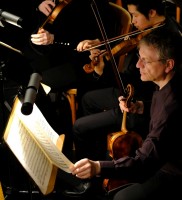
Are you slightly bored after 25 years as an orchestra player?
Absolutely not. Every day is different, and we always play new music, like opera, musical, operetta, ballet and symphony concertos. An orchestra seat like this one is a privilege, and not easy to come by nowadays.
What was your first orchestra job?
Prior to my first position, I attended the Orchesterschule Wolfgang Hock in Gernsbach. Mr. Hock was a concertmaster with the Südwestfunk orchestra back in time. I profited a lot from this education. In 1990 I played at Lissabon's opera Sāo Carlos for half a year. That was intense. There were seasonal events, many different pieces and always different conductors, seven, eight performance, then up to the next work. Upon my return, I worked ad hoc for the Stadttheater St. Gallen, for one and a half years. In 1992 I received my position in Pforzheim.
Did you ever have any trouble reading the tenor clef?
Still (laughs). We often receive sheet music with tenor, treble or bass clef. The ongoing switching can be crazy at times...
After such a long time in the orchestra, you probably read all music at first sight?
Yes, mostly. Do you know this joke: The violist comes home, and his wife asks: «What did you play today?». He says: «I don't know, the sheet music book was alreay opened.»
Do you have an affinity with chamber music?
Yes, music for voice, viola and piano is my passion. Together with my wife - she is an opera singer - we've been touring with our own programs for 20 years.
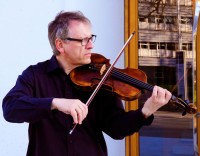
Are there any original works for this line-up?
Absolutely, there is a wealth of works. We are on the trails of Lore Fischer and Rudolf Nel. Nel was a violist with the Bayrischer Rundfunk. Lore Fischer was a singer, and a professor for vocals at the Sturrgarter Hochschule in the 50s and 60s.
Plenty of music was written for her (Jan Koetsier, Otto Jochum, Hermann Reutter and many more). There's also old literature by Brahms (two sacred chants op. 91) and plenty more. We found Fischer's and Nel's bequest at the Stuttgarter Musikhochschule.
Do you teach as well?
I used to work at the Musikschule Neuenbürg, close to Pforzheim. There I had many students. When we bought our house in 2003, in the rural area south of Pforzheim, I founded my own private music school. The teachers travel to us - an advantage, for they don't need to travel to their students' homes. It's been going well for the last 12 years.
You also run a viola shop...
It isn't a shop in the closer sense. We sell and provide string instruments, from student to concert models. We also sell accessories. We accept string instrument and bow service requests of all kinds, and forward them to our trusted specialists.
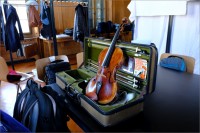 What makes the viola particularly interesting for you?
What makes the viola particularly interesting for you?
The viola is a versatile instrument. No two violas are alike, neither in their size, nor in their sound. It originates from two different instruments, a smaller sized, agile form, and a larger viola, which had the function of a filling instrument. 250 years ago, when the string quartet had its first boom, the large, low tenor viola with 48 cm corpus size and the brighter alto viola were further developed, bringing out today's modern viola.
The «biodiversity» has been decimated...
Yes indeed, and the stronger instrument survived. The development focused on virtuosity. That's why a large, unwieldy instrument such as the tenor viola didn't stand a further chance. Still, people long for the tenor-like sound of the larger violas. It's a big field for viola makers, using all kind of methods to successfully compensate the viola's small volume in relation to its register.
You seem to know your way around the design types of instruments?
I've learnt the most from the instruments. As said, among violas there are no two alike instruments. Some passages can be hard on one instruemnt, and easy on another one. There are huge differences in playing an instrument for solo, chamber music or orchestral purposes, how the partnering instruments sound, and if one plays in larger or smaller venues.
Which model do you play?
I like to practice with an Andrea Guarneri - a replica from Wolfram Neureither, Montpellier in medium size. Depending on situation and requirements, I may switch to a larger or also smaller instrument. There's a wonderful replica worth mentioning, of an old German viola by Bernd Hiller, Markneukirchen, as well as the Ritterbratsche by Adam Hörlein from 1886 for the trio parts.
Which violists do you like most?
I really appreciate the glorious four; Tabea Zimmermann, Juri Bashmet, Kim Kashkashian and Nobuko Imai.
What's your judgement on today's Classical Music scene.
On one side there's a lot of culture happening, however on the other side, the value of classical music is being thinned out more and more. Germany still has 129 professional orchestras. After the millenium, there were 168 still. Since then, there have been countless fusions and downsizings. The trend is still pointing downwards, despite plenty of tax revenues.
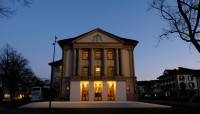
Shouldn't our music and theatre culture be expanded, rather than cut?
Of course it should. It is a considerable achievement of the western world. Furthermore, it is an economic factor. While orchestras are being downsized, universities are training increasing numbers of highly qualified young people, who then have to deal with fewer, and worse paid jobs. Let's hope that the German orchestra and theatre scene will be put on the list of the UNESCO Intangible Cultural Heritage in 2019. Efforts have been made continuously, over the past 10 years. We are already on the national list since 2014.
What are your upcoming highlights?
Our next concerto with the Hahn-Trio takes place on June 24th, 2018, in the Königliches Kurtheater Bad Wildbad. The next orchestral event is the season opening in September, with Wagner's Rheingold.
Mr. Hahn, thank you for this interesting conversation!

Niklaus Rüegg
This blog article is written by Niklaus Rüegg, graduate of the Zurich International Opera Studio, graduate of the Basel Opera Academy, twice winner of the Migros Gifted Scholarship, numerous engagements in opera, operetta, musicals and concerts in Switzerland and abroad.
Rüegg has also been working as a music journalist for ten years and is responsible for the association pages of the VMS (Verband Musikschulen Schweiz) in the Schweizer Musikzeitung.
As a young man, Niklaus Rüegg had played the violin and viola.
Photos: Mark Walder, 2018
|
Write an input |
2. Find the composer or work for which you want to write an input.
3. On the right side: click on «Write an input».
Pseudonym
Your input will only be published under your pseudonym. Under «My account» you can enter your pseudonym at any time.
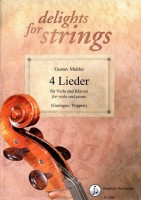
4 Lieder - for Viola and Piano
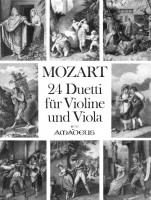
24 Duetti "Die Zauberflöte" and "Don Giovanni" [with facsimile] - for violin and viola
| You may also be interested in |
The literature described in his epochal viola guide «Music for Viola» has all been played, described on index cards and archived by Konrad Ewald himself. Most of it is, or was, in his possession and is neatly arranged and filed.
» To the viola blog
Research Topic Viola Music
The musicologist Phillip Schmidt has dedicated himself to 18th century viola music. Schmidt originally wanted to become a singer or chemist, but then decided to pursue a career in musicology. He pays special attention to the viola, his favourite instrument, which he also plays himself.
» To the viola blog
Viola letter |
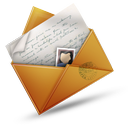 Do you don't want to miss any news regarding viola anymore? Our viola letter will keep you informed.
Do you don't want to miss any news regarding viola anymore? Our viola letter will keep you informed.» Subscribe to our viola letter for free
|
|
 Visit and like us on Facebook.
Visit and like us on Facebook.» Music4Viola on Facebook
